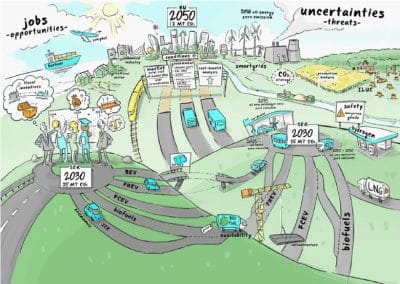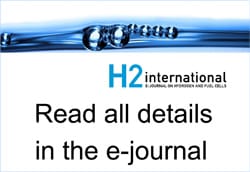After the parliamentary election in the Netherlands this March, it quickly became clear that the previous coalition partners could no longer hope for a majority. Talks about forming a new government have yet to yield any results. One reason for the breakdown in mid-May negotiations between the parties most inclined to join forces – VVD, Christian Democratic Appeal, Democrats 66 and GreenLeft – was their disagreement on environmental policy. Of course, this offers little planning security in climate protection, energy supply and clean transportation, and subsequently hydrogen and fuel cells, but has so far kept the country on the course it charted in 2007, when the aim was to set up a “green transportation sector.”
In 2013, the Netherlands passed a national energy agreement, Energieakkoord voor duurzame groei, for sustainable growth. It had been drafted following numerous discussions between Dutch politicians, employees, unions, environmental organizations, civic institutions and the financial industry. The agreement stipulates a yearly reduction in the energy used in transportation of 15 to 20 petajoules (around 5 terawatt-hours) by 2020 compared to 2012. Emissions in 2030 must not exceed 25 megatons of CO2 equivalents, a 17 percent drop compared to 1990. In 2035, the transportation sector is to emit only 60 percent of what it had in 1990 (tank-to-wheel).
These targets have made hydrogen an even more crucial part of the Dutch transportation market, next to biofuels and electricity. The Netherlands has been a supporter of exploring the gas’s potential for about 20 years – long before it announced its Energy Strategy 2013. The country intends to become a world leader in this field and for good reason, as several factors point to a very favorable environment for expanding the market.
…
Dutch programs
Consequently, clean transportation has become the focus of H2 and fuel cell technology advances throughout the country. The government, namely the Ministry for Infrastructure and the Environment, Rijkswaterstaat, is encouraging those efforts, mainly by funding research activities and demonstration projects. Additionally, it offers tax rebates and incentives and supports public-private partnerships.
The largest and most important subsidy program on transportation is called De auto van de toekomst gaat rijden, which roughly translates as: “The car of the future will arrive.” Its objective is to accelerate the market introduction of promising technologies, turning the Netherlands into a test lab for sustainable transportation ideas. Questions to which the project intends to find answers include how vehicles are classified, what “green” vehicle taxation and leasing contracts may look like, for which applications hydrogen could be used as an alternative fuel, and how to set up smart grids and multi-vector transportation value chains.
Today, the most prevalent method to demonstrate H2 and fuel cell potential in transportation is the deployment of buses in mass transit. These national activities have been closely intertwined with the ones at EU level.
Green deals
Last April, the infrastructure ministry made an agreement with mass transit operators in the country as part of the government’s Green Deal Initiative. It will ensure that only zero-emission buses will be added from 2025 at the latest and that all of them are emission-free by 2030 (today, there are about 5,000 buses in operation in the Netherlands), while the entire public system also needs to be renewable-only by that time.
Eindhoven has already had two fuel cell buses in use. In August, another two were added to the fleet in Rotterdam. More are planned to be deployed in Groningen and Arnhem at the end of the year and together with the Benelux countries, the Netherlands has joined FCH JU’s JIVE project, which intends to bring (a minimum of) 50 buses to three or four regions. Currently employed models also include battery-electric versions, such as the 18 vehicles (with overnight charging) in use on several Dutch islands. And the Eindhoven region is planning to add another 42 with opportunity charging.
National H2NL hydrogen platform
As a public-private partnership, there is the national H2NL project, which was established in cooperation with the Dutch hydrogen and fuel cell association – Nederlandse Waterstof en Brandstofcel Associatie. It is thought to provide a platform for an exchange of ideas between politics, industry and research to advance H2 developments. It is also intended to ensure that the government can deliver on the 2025 hydrogen targets, namely 20 new H2 refueling stations, 1,500 to 2,000 fuel cell cars and 100 buses (including the relevant opportunities to fill up their tanks), up to 500 delivery vans and 20 trucks for zero-emission logistics in urban areas. When the platform can begin its work, however, will entirely depend on the successful formation of a new government and official approval.
…
Power to Flex
Power to Flex is a Dutch-German cooperation project during which businesses, research organizations and government agencies from the north of the Netherlands and northwest Germany will develop demonstration systems for renewable storage. There will be individual tasks to design storage solutions in building engineering – both for single-family houses and large residential complexes and commercial premises – and in transportation. The project started last December.
IPHE meeting
The Netherlands will host the 28th Steering Committee Meeting of the International Partnership for Hydrogen and Fuel Cells in the Economy this November.
Author: Alexandra Huss



























Promises like this are sounding rather familiar.
Since decades.
I wonder, if there is selective awareness involved?
Better known as: Wishful Thinking.
How extraordinary: Amsterdam bans H2 totally, Rotterdam & Eindhoven have four (4) H2-busses and NL has an astonishing record of two (2) H2-refill stations nationwide. Also Dutch hydrogen and fuel cell association is dead for years while demissionair government offers tax rebates and incentives and supports public-private partnerships while funding research activities and demonstration projects. None of such is noticeable other than (virtual) plans.
This text seems like political propaganda for GreenLeft, a small mini-party in the Netherlands with communist roots.
Thanks Alex, for telling us the truth.
it is always good, to have real eye-witnesses.
Meanwhile, Shell Oil, no stranger to Dutch soil, seems to be vigorously forging ahead in H2. Bus manufacturer Van Hool right over the border is quite successful throughout Europe in marketing its buses and is clearly gaining momentum.
No one can realistically expect government to do everything, even if significant progress has been made. We can however be sure that the stakes are high enough that private interests will relentlessly pursue H2 programmes – as they are doing e.g. via the Hydrogen Council. This latter represents over €1 trillion in capital interested in creating a hydrogen economy. It has taken time, alas, Rome wasn’t built in a day.
The pull they are manifestly creating is bringing even the most recalcitrant stakeholders to the table.
Those are substantial facts, not propaganda. One is free to take them into consideration or not. The facts, however, remain.
And they are evolving quite positively. At the speed of electricity…
OMG.